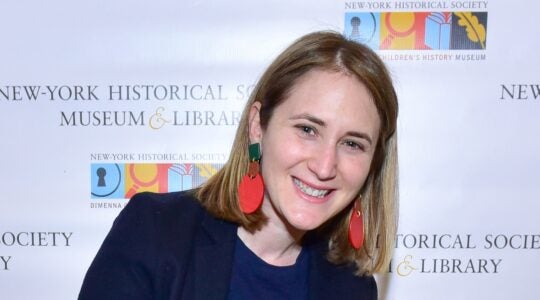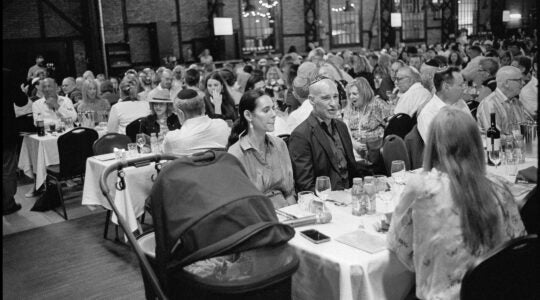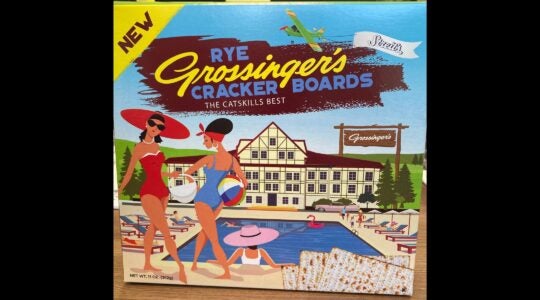Born in Eastern Europe and raised to its full height on the Lower East Side, the Yiddish theater was always a mongrel art, based on the recycling of serious European dramas, jaunty operettas, helter-skelter variety shows and other high- and lowbrow entertainment. Now, wrapping up a two-year odyssey into Yiddish theater, the Target Margin Theater Company presents a series of new theatrical works that are based on unusual sources ranging from the sweatshop poetry of Celia Dropkin to the comedy of Lenny Bruce. The cutting-edge series, called the Winter Lab, kicks off this week on the Lower East Side.
Directed by David Herskovits, Target Margin has always played with the boundaries of theater, and its current focus on Yiddish drama is no exception. Over the course of its Yiddish theater project, called Beyond the Pale, the company has breathed new life into almost two dozen Yiddish classic dramas by presenting them in irreverent, avant-garde, English language productions with multicultural casts. The new Winter Lab, by contrast, mainly uses other forms of Yiddish literature — with a dose of American pop culture — as a springboard for artistic experimentation in a Yiddish vein.
First up is a double bill of “The Secret of Life” and “Three Gifts for Lenny Bruce.” The former, based on a play of the same name by Yiddish dramatist Leon Kobrin, dispenses with the dialogue and turns the story into a hip-hop, ballet piece. The latter, an adaptation of Y.L. Peretz’s short story, “The Three Gifts,” imagines the controversial Jewish comedian of the title in a kind of purgatory where he is obliged to revisit aspects of his past, including the pasties of his stripper ex-wife and his own obscenity trial, in order to acquire wisdom. Next, Mendele Mocher Sforim’s novella, “The Travels of Benjamin III,” inspires “The Lost Tribe,” which is about a dinner party that goes awry.
A final double bill consists of “At the Rich Relatives: An Anachronistic Operetta After Celia Dropkin” and “Good Night, World.” The first is based on Dropkin’s poetry, and the second is a play about a group of adventurous young poets in Jazz Age New York. The series concludes with a free evening of dialogues from Sholem Asch’s bestselling 1946 novel, “East River,” which is about a romance between a Jewish boy and a Catholic girl on East 48th Street.
In an interview, Herskovits told The Jewish Week that in addition to allowing the company to “shine a light on other Yiddish literature, especially poetry and novels,” the new series is very much in the boundary-busting spirit of Yiddish theater. “Yiddish companies reconstructed — or pirated, or cannibalized — all kinds of material. It was like in Elizabethan England, where there was no system of copyright and it was a kind of free for all — a situation of exuberant artistic competition. That’s how Yiddish theater got its muscularity.”
Andrew Simon is the lead artist for “The Secret of Life.” In an interview, Simon noted that Kobrin was dubbed the “Yiddish Zola” for his socialist realist dramas that recalled the work of the pioneering French journalist, Émile Zola (who famously reported on the Dreyfus Affair). But, Simon said, Kobrin set a very different tone with “The Secret of Life,” one that Simon calls “pastoral, mythological and stylized.”
Simon was enraptured by the Kobrin play about a poet who is confronted with two different visions of reality, one symbolized by an old man (who focuses on practicality) and the other by a young woman (whose spirit is infused by passion and art). He presents a purely movement-based exploration of Kobrin’s themes, using the “klezmer-funk” music of clarinetist David Krakauer.
Simon, who is Jewish but not observant, views the Target Margin series as creating a new fusion, “combining a piece from a type of drama that is almost extinct to something contemporary and alive.”
Susan Hyon, who is Korean-American, has acted in a number of Target Margin’s productions. As the lead artist on “Three Gifts for Lenny Bruce,” Hyon began by asking playwright Jim Knable to write what she called a “dry, police report” account of Peretz’s short story, a fable in which a spirit tries to win entry to heaven by offering bribes to the saints — the gifts, all of which are bloody, are taken from Jewish martyrs; the saints frown on the gifts as beautiful but useless.
The satirical tale, Hyon recalled, reminded Knable of Lenny Bruce’s “snarky, edgy” quality, and she and Knable decided to center the play around the comedian and the lessons that he might have learned if he had been obliged to think back on the pivotal events of his life. The resulting work, Hyon explained, is “not really Yiddish theater, although it’s inspired by a work of Yiddish literature.” But the playwright, she said, was “on to something in picking Bruce, who had the same over-the-top, extremely emotional, posturing spirit of the whole Yiddish theatrical tradition.”
Target Margin’s dramaturg, Debra Caplan, first met Herskovits when she was finishing her graduate work in Yiddish at Harvard. Caplan’s role with the project, she told The Jewish Week, is to work with actors, most of whom are not Jewish, and help them to embody the rich tradition of Yiddish culture. But Caplan also sees her role as educating the audience. The company aims to “subvert expectations,” she said, by doing, for example, “an erotic love scene that has none of the comedy and schmaltz that people have come to expect from Yiddish theater.”
The avant-garde, experimental vibe of Target Margin’s work, Caplan, said, appeals to an audience that “skews young and diverse. It’s pretty exciting to see someone in her eighties who speaks Yiddish from her home sitting next to a young Brooklyn hipster.” Unlike the Folksbiene, which typically presents classic Yiddish plays in the original language, Target Margin is, according to Caplan, “not so much about preserving Yiddish theater as incorporating it into the American theater at large. It’s a whole new stage in Yiddish theater.”
Target Margin Theater’s Winter Lab runs from Wednesday, Feb. 12 to Saturday, Feb. 22 at the Abrons Arts Center, 466 Grand St. For a complete schedule and tickets, $15, call OvationTix at (212) 352-3101 or visit www.TargetMargin.org.
The New York Jewish Week brings you the stories behind the headlines, keeping you connected to Jewish life in New York. Help sustain the reporting you trust by donating today.




